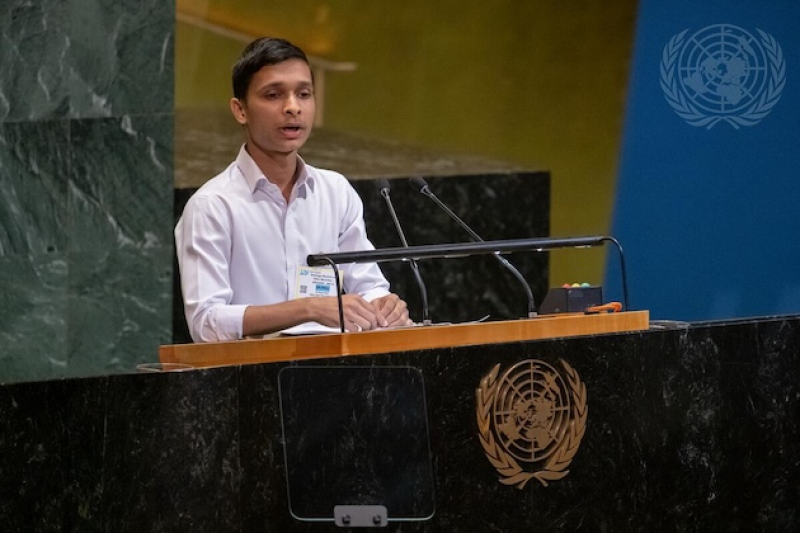- Hadi's condition 'very critical' after bullet causes 'massive brain injury' |
- DMP intensifies drive to arrest attackers of Hadi |
- Tarique terms attack on Hadi a conspiracy against democracy |
- Man held for tying, beating up youth on theft suspicion in Gazipur |
- Sajid (2) lifted after 32 hrs from deep Rajshahi well, not alive |
UN Reaffirms Support for Rohingyas and Myanmar People

Maung Sawyeddollah, Founder of the Rohingya Students Network, addresses the high-level conference of the General Assembly on the situation of Rohingya Muslims and other minorities in Myanmar
The international community convened a high-level meeting at UN Headquarters to mobilize political support for Rohingya Muslims and other minorities in Myanmar.
On Tuesday, September 30, representatives from Rohingya advocacy groups, UN agencies, and member states gathered at the General Assembly to discuss ongoing challenges facing Rohingyas and the broader humanitarian and political situation in Myanmar.
UN General Assembly President Annalena Baerbock said the conference offered an opportunity to hear from stakeholders, particularly civil society representatives with experience on the ground. “Rohingya need the support of the international community, not just in words but in action,” she said, emphasizing the urgent need for strengthened solidarity and a political solution with full Rohingya participation.
UN Human Rights Commissioner Volker Türk described the situation as a crisis of grave international concern. “The violence, extreme deprivation, and massive human rights violations demand action. We stand in solidarity with the Rohingya and all people of Myanmar in their hour of greatest need,” he said.
Since over 750,000 Rohingyas fled to Bangladesh eight years ago, the refugee crisis has become one of the most intense in recent memory. Conference attendees stressed addressing the root causes, including systemic oppression and persecution by Myanmar authorities, compounded by unrest in Rakhine State.
The 2021 military coup further destabilized Myanmar, making safe, sustained returns for Rohingyas increasingly precarious. Activists highlighted that the oppression predates the current crisis, with decades of suffering for ethnic minorities, including Kachin and Rohingya communities.
Funding shortfalls for UN agencies like UNICEF and the World Food Programme have limited humanitarian aid. The 2025 Rohingya Refugee Response Plan of $934.5 million is currently only 38% funded, raising concerns for food and essential services in the camps. UN High Commissioner for Refugees Filippo Grandi warned that without additional resources, lives could be lost due to malnutrition or unsafe journeys.
Bangladesh, hosting over 1 million refugees since 2017, faces its own development challenges. Chief Advisor Muhammad Yunus stressed the need for repatriation, noting the Rohingya’s consistent desire to return home. Regional blocs like ASEAN also play a critical role in supporting refugees and encouraging dialogue with Myanmar stakeholders.
The conference emphasized long-term solutions beyond emergency aid, including education, legal work opportunities, and resettlement. Rohingya representatives highlighted barriers to higher education, citing successful scholarship examples at New York University and the Asian University for Women in Chittagong.
Participants called for increased funding, justice under international law, and empowerment initiatives for Rohingyas. Myanmar’s UN representative Kyaw Moe Tun condemned the military junta and urged global action to end the dictatorship and uphold human rights, justice, and democracy.

